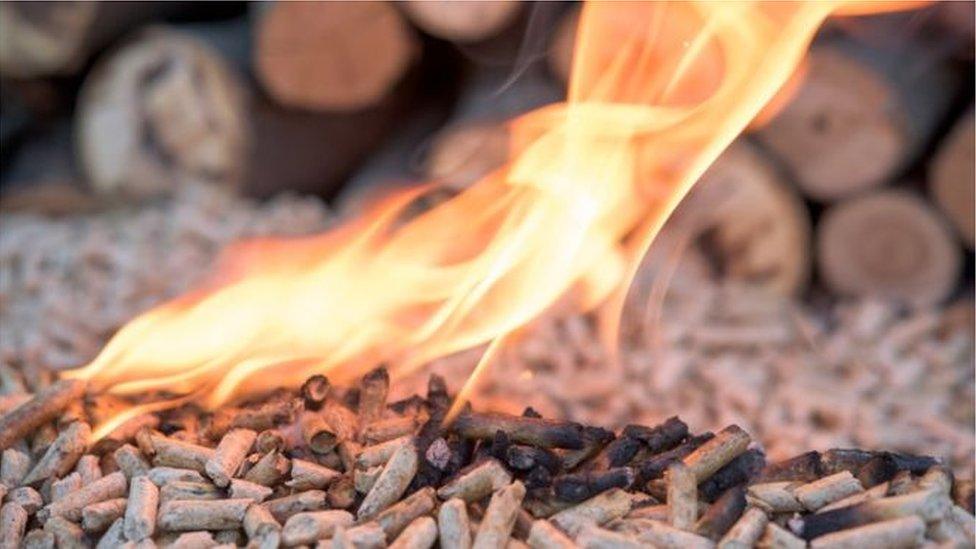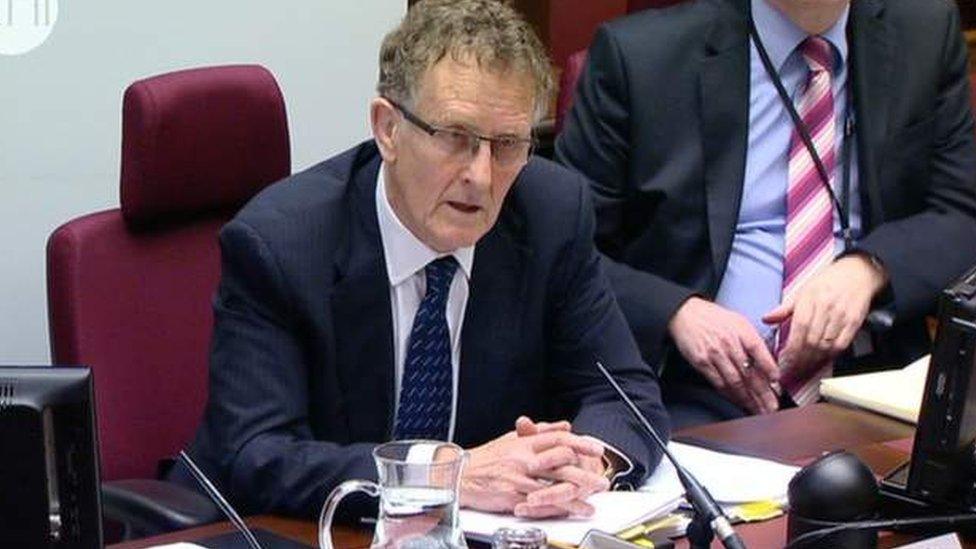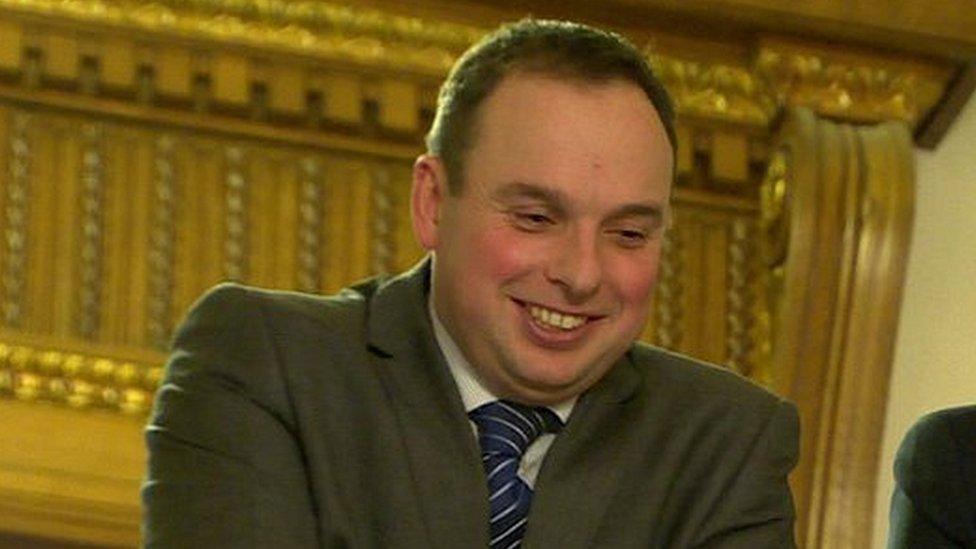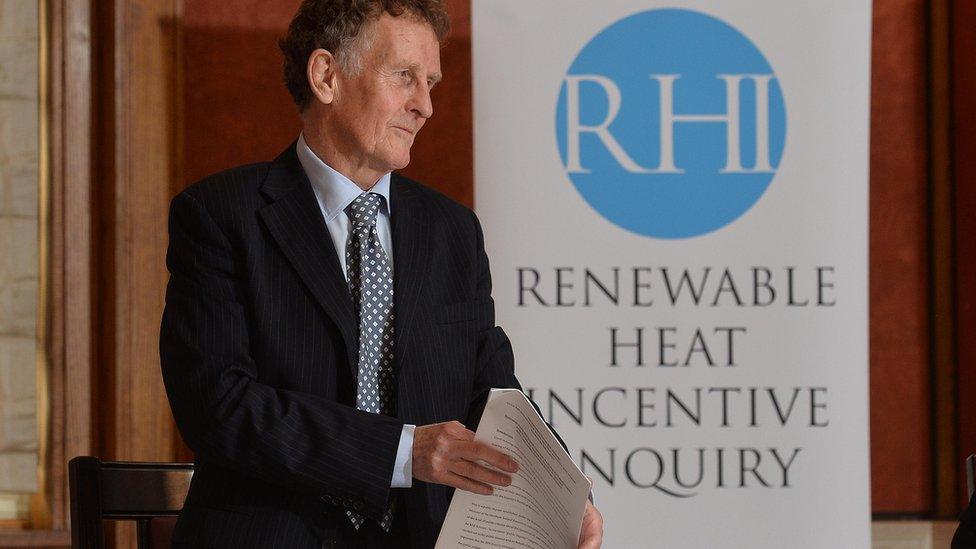RHI inquiry: Crawford 'did not try to keep scheme open'
- Published

The scheme subsidised fuel costs to encourage the use of renewable heating systems such as biomass boilers, mostly burning wood pellets,
An ex-DUP special adviser has told the RHI inquiry he did not try to keep the flawed green energy scheme open as it ran out of budgetary control.
Andrew Crawford said the accusation had been made by a senior civil servant at a Stormont committee in January 2017.
He said he then became the focus of a media and political storm leading to his resignation days later.
He had been DUP leader Arlene Foster's adviser at the finance department.
He had followed her there from the enterprise department, where she had responsibility for the scheme.
Mr Crawford said he had provided the inquiry with evidence that proved he had not been seeking to keep the scheme open when it was haemorrhaging public money.
"For people to say, at that stage, that I was trying to keep the scheme open, runs contrary to what I was doing at that time and what evidence I can produce to the inquiry and have produced to the inquiry," he said.
Counsel to the inquiry Joseph Aiken QC said the public perception of special advisers (Spads) was that they lived "in the shadows but are wielding a lot of power".
Mr Crawford replied that he considered Spads were most effective when they were "anonymous" or in the background helping their minister.

Analysis
By Jayne McCormack, digital politics reporter
Wednesday's session gave an insight into the secretive world of Stormont's special advisers and how much power they can wield.
Andrew Crawford seemed to start off nervously, but settled in as he was quizzed about the training he was given when he began working as a DUP special adviser in 2007.
He said he didn't recall ever receiving any formal training, but did get advice from other special advisers about the "dos and don'ts" involved in carrying out the role.
Mr Crawford also sought to point out that his job was "purely to advise the minister" - telling the inquiry it's ultimately up to ministers what decisions they make.
That claim may prove to be somewhat contentious when the DUP ministers who oversaw the running of the scheme give their evidence to the inquiry.

"I always believed that if you became the story you couldn't advise behind the scenes," he added.
He said the media and public attention on him after the accusation by a senior civil servant before the Public Accounts Committee in January 2017 left him in a position where he felt he had to quit.
He said he now focused mainly on farming and did some part-time policy work for the DUP.
In his witness statement to the inquiry, external, Mr Crawford said he sent confidential government proposals for cost-control measures in the RHI scheme to two relatives, months before they were made public.
He said he now accepted that had been "inappropriate" and he regretted it.
The RHI scheme was an initiative offering financial incentives to encourage businesses to switch to using renewable fuels to generate heat.
But critical flaws meant that its claimants could earn substantial returns, far greater than intended.
The cost controls on the scheme were needed to deal with increasing pressure on the budget as the number of applications began to steadily rise.
In the weeks between the controls being announced in September 2015 and being introduced that November, hundreds of applications flooded into the scheme crashing the budget and ultimately forcing its closure.
'Clear rationale'
Mr Crawford also told the RHI inquiry that nationalist politicians could resist wholescale adoption of GB legislation to Northern Ireland.
He said such resistance was sometimes "factored in" by his former minister Arlene Foster when it came to decision making.
The inquiry has heard suggestions that the RHI debacle may never have happened if Northern Ireland officials had simply copied an existing GB scheme.
It had a much bigger support network running it.
Part of the problem in Northern Ireland was the lack of staff, most of whom had no energy expertise.

Sir Patrick Coghlin is chairing the inquiry into how the Renewable Heat Incentive scheme was set up and carried out at Stormont
Mr Crawford said when it came to policy, nationalist politicians in Sinn Féin and the SDLP would have had "issues with powers remaining at Westminster".
He said unionist politicians had to have a "clear rationale" for following Westminster's policy lead.
Witness line-up
"I'm not saying they would be opposed to it, but you would have to work your way through why we were not devolving the power ourselves," he told the inquiry.
He said it was part of the process that would have been going through his and Arlene Foster's mind when it came to policy decisions.
He said it was also something that would have been considered by civil servants, "albeit they are politically neutral".
Meanwhile, the list of witnesses lined up for next week now looks set to be changed.
Inquiry chair Sir Patrick Coghlin said he wants to hear evidence from Andrew Crawford and Arlene Foster at the same time.
It is hoped they might be able to give evidence on additional days next week.
Sir Patrick said the panel felt it was important that continuity of their evidence, which was closely bound up, was not lost.
- Published10 April 2018

- Published10 April 2018

- Published7 November 2017

- Published7 November 2017
